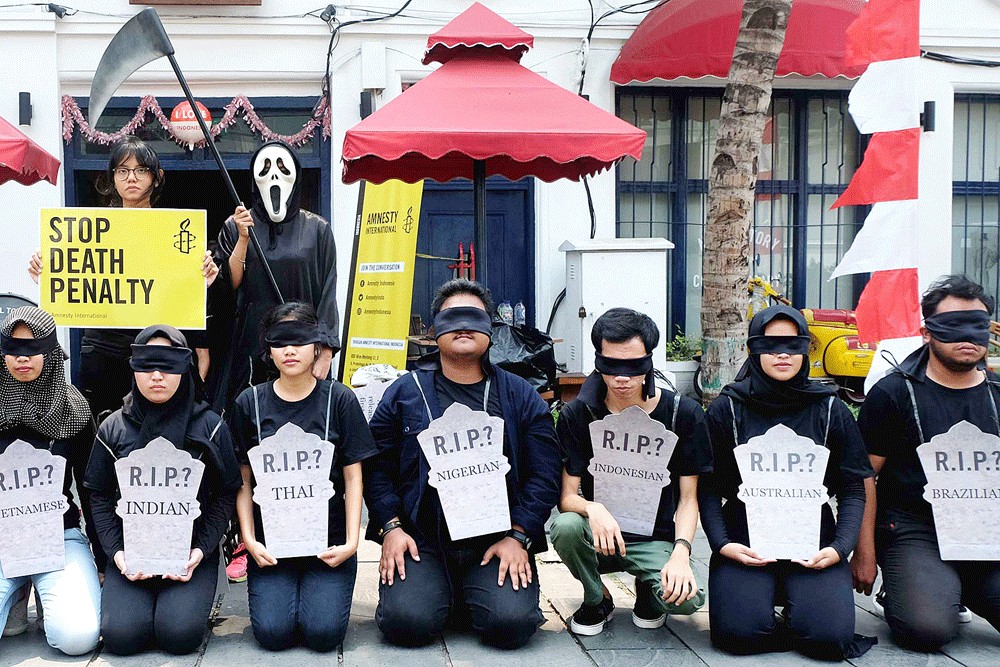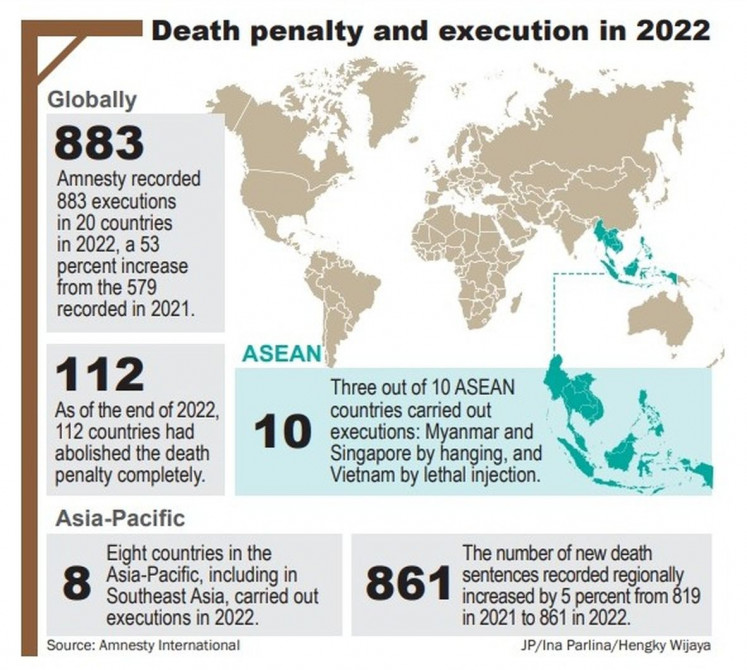Popular Reads
Top Results
Can't find what you're looking for?
View all search resultsPopular Reads
Top Results
Can't find what you're looking for?
View all search resultsNew penal code offers hope of abolishing death penalty
Change text size
Gift Premium Articles
to Anyone
A
recent report from Amnesty International suggests that Indonesia's revised Criminal Code is a step in the right direction toward abolishing capital punishment, even as the country’s justice system continues to hand down high numbers of death sentences.
Passed at the end of last year, the revised Criminal Code introduced an automatic 10-year probation for convicts on death row to demonstrate good behavior for the possibility of having their sentences commuted. After the probation elapses, the sitting president may decrease the sentence to life in prison or 20 years in prison. The policy will take effect in 2026.
Amnesty International Indonesia researcher Ari Pramuditya said that although Indonesia still had a long way to go before the death penalty was completely abolished, the new penal code was "a positive step" that deserved recognition.
"However, we still need to closely monitor its implementation. Amnesty will continue to push for the total abolition of the death penalty. Although the probation for people sentenced to death is a step in the right direction, it's not enough, and we still have a long way to go," Ari said at a press conference on Tuesday.
Amnesty International Indonesia executive director Usman Hamid said the country had to use the opportunity to significantly reduce instances of capital punishment after years of what he said were shockingly high figures.
Indonesia has continued to record-high numbers of death sentences in recent years, with 112 instances 2022, just two fewer than in 2021, according to Amnesty. In 2020, it recorded 117 death sentences. As of Monday, there were 452 convicts awaiting execution.
Death penalty and execution in 2022. ( Amnesty International/ JP/Ina Parlina/Hengky Wijaya)Zero-tolerance policy
Ari said one of the main reasons for Indonesia's high level of death sentences was President Joko "Jokowi" Widodo's "zero-tolerance" policy against drugs, with drug crimes accounting for 94 percent of all death sentences last year.
"Some judges even mentioned Jokowi's zero-tolerance approach to drugs as a contributing factor for handing out the death penalty to drug offenders," he said.
According to Ari, support for the zero-tolerance approach was partly based on the misguided idea that the death penalty deterred drug-related crimes. Despite the high number of drug convicts sentenced to death, he noted, Indonesia continued to see a growing number of drug users.
Read also: Lawmakers pass revised Criminal Code despite protests
A 2022 study from the National Narcotics Agency (BNN) found that some 3.6 million people had used illicit drugs in 2021, a 5.5 percent increase from 2019, when the country recorded some 3.4 million drug users.
Ari added that efforts to abolish the death penalty in Indonesia had been hampered by the popularity of "penal populism", a process where politicians and policymakers devise more punitive policies to gain support from voters.
"Most Indonesians are still supporting the death penalty for crimes like drug offenses, terrorism, violent murders, even corruption. Many politicians use this to gain popularity and support from the public," he said.
A step forward
Aside from the 10-year death penalty probation, Amnesty Indonesia also applauded Jokowi's recent decision to grant clemency to death-row drug convict Merri Utami.
Merri was sentenced to death by the Tangerang District Court in 2002 for carrying 1.1 kilograms of heroin from Nepal to Indonesia. She claimed her then-boyfriend had tricked her into bringing the drugs into the country and that she had been tortured into signing a confession of guilt during her interrogation.
Read also: Activists applaud clemency for death-row drug convict Merri Utami
Merri was spared execution at the last minute in 2016 after asking for the President’s clemency that same year. In March of this year, Jokowi finally commuted Merri's sentence from the death penalty to life in prison.
Usman said the President’s move served as a pivotal moment for Indonesia.
“The authorities must follow this act by commuting the death sentences of all others who remain on death row in appalling conditions," Usman said. "It is beyond time for the government to announce an official moratorium on executions and fully abolish the death penalty, ending the anguish of at least 452 people on death row, who often suffer in isolation for years, sometimes decades."
Under the revised Criminal Code, capital punishment is now designated as an alternative to 20 years in prison or life imprisonment, to be used as “a last resort”.











